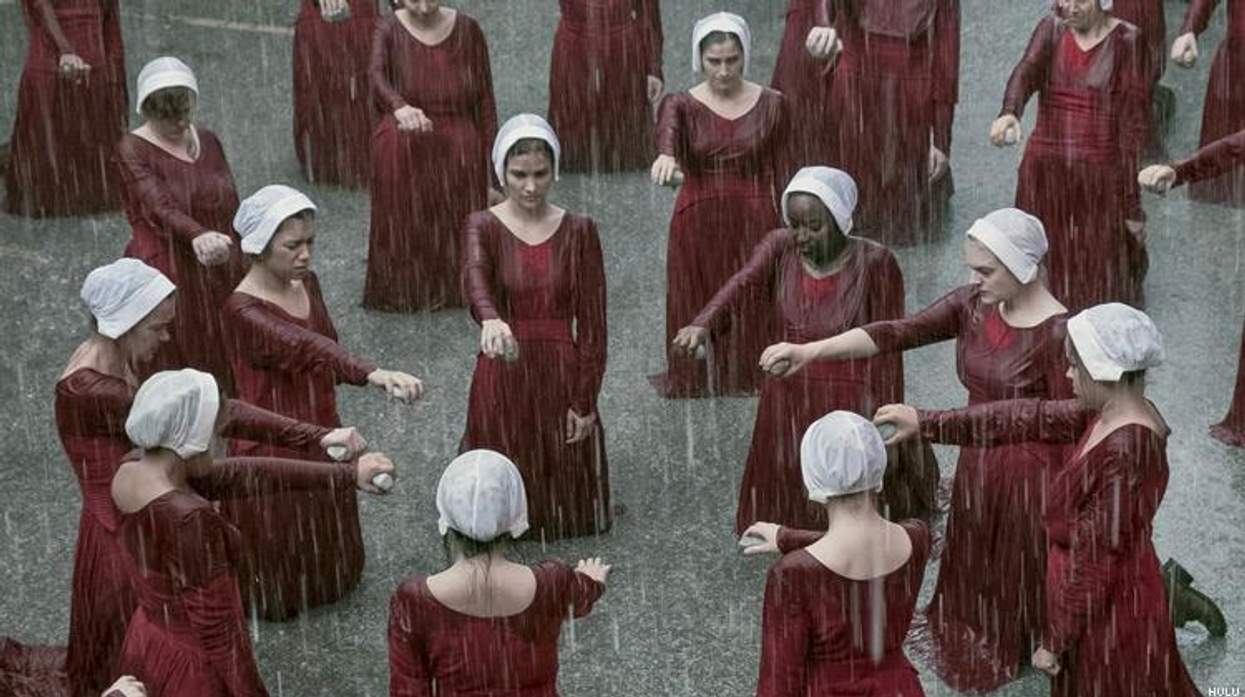For most women, Hulu's The Handmaid's Tale is terrifying and heart-wrenching. The show's portrayal of a world that is dehumanizing, spiteful, and disgustingly violent toward womanhood feels only a few steps removed from today's reality. Yet unlike most women, I have found it hard to actually identify into a world where I, as a transgender woman, would already be dead.
The Handmaid's Tale is set in Gilead, a near-future society where the political fallout of a worldwide infertility crisis and nuclear war led to a nonspecified religious sect gaining political control of America. In this society, fertile women are both venerated and subjugated. They become "handmaids" -- a farmed resource, banned from reading and free movement, and subjected to ritualized rape and abuse. Any nonfertile women seen in the show are either torturing the handmaids or serve as housekeepers, as wives, or in other stereotypically domestic roles.
Under the new religious regime, people showing LGBT tendencies, such as having same-sex relationships, are immediately killed as "gender traitors" or sent to a nuclear wasteland to work until they die from radiation poisoning. The only exceptions are the handmaids, whose fertility is precious, and therefore they are protected from the death penalty. Yet this doesn't stop them from being punished in horrific ways.
It's not shocking that trans people aren't represented in this world. Unlike many of our cisgender queer counterparts, transgender people who have started transitioning may find it very hard to go back into the closet to protect ourselves. We are sometimes very visibly transgender due to old-fashioned gender stereotypes that a society like Gilead heavily leans into. We trans people would quickly be branded "gender traitors."
Even the fertility that protects other queer women in The Handmaid's Tale may be out of reach for transgender people. Many trans people, especially trans women like myself, become sterile when they take hormones or have gender-confirmation surgery. Even more horrifying, in many countries around the world like Greece and Finland, trans people have to prove they are sterile before they can even change their gender markers. France only just outlawed this practice as inhumane last year.
With all this in mind, it becomes hard for me to identify within the world of The Handmaid's Tale. How can I feel June's terror at her situation when I know I would never face it myself? I can sympathize but not empathize with so many of the show's stories. This feeling of being left out can sometimes hurt, especially given the cultural significance that The Handmaid's Tale has come to represent for a lot of women under the Trump administration.
That's not to say that I demand trans representation in The Handmaid's Tale like I do from other TV shows. The Handmaid's Tale represents an important conversation we need to have about women's place in the world. With Donald Trump's attacks on women's health organizations like Planned Parenthood, women's reproductive health is very much at stake. It's a crucial fight that I as a woman without a uterus don't have the right to suppress. While I am a woman and will always fight for inclusion in women's spaces, there are battles that cis women face that trans women don't, and there are battles that cis women don't face that trans women do. Yet we are all still women. We (should) all stand together to fight for and with each other.
The trans community's exclusion from the futuristic narrative of The Handmaid's Tale is understandable. It just becomes emblematic of the daily fears that I face. Every time I hear about the trans military ban, the Department of Education rescinding protections for trans students, a transgender bathroom bill being voted on, or another conservative rally screaming out, "There are only two genders!" I'm reminded that I and trans people like me would likely be the first ones to die if Gilead ever comes to pass.
Yet maybe The Handmaid's Tale should address this. The series often presents flashbacks showing how Gilead came to be. Perhaps a trans person's struggles could appear there. Or back in the future world of Gilead, what if a character identified as transgender in this world? How would they hide or suppress it? Or what if there was a "passing" infertile trans woman who desperately had to hide her trans identity from the government? Or a trans man still able to carry babies forced to be a handmaid despite being a man? Adding trans people to the narrative could complicate the story in new and interesting ways that draw attention to not only the oppression of all trans people, but all genders (#ImAvailableforaWritersRoomJob).
I'm preparing to binge every episode of The Handmaid's Tale. The show's lack of transgender characters, whether intentional or unintentional, brings up a lot of questions about what the future may hold for the trans community in a dystopian world. Even if a real Gilead comes to pass -- and I don't make it through the first act -- I still want to know how it ends. I'm just saddened that I may not get to join the fight.
JESSIE EARL is a video producer for The Advocate.















Charlie Kirk DID say stoning gay people was the 'perfect law' — and these other heinous quotes
These are some of his worst comments about LGBTQ+ people made by Charlie Kirk.